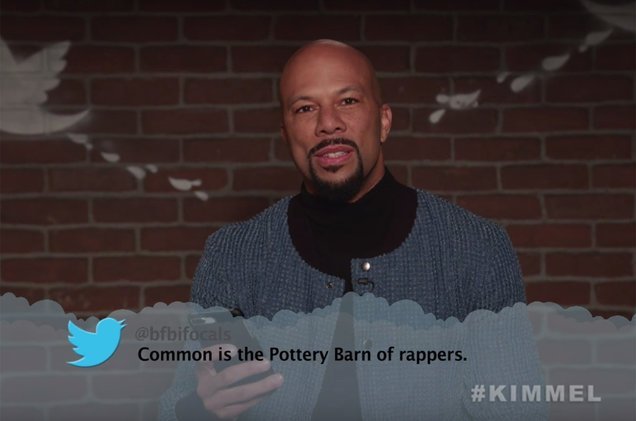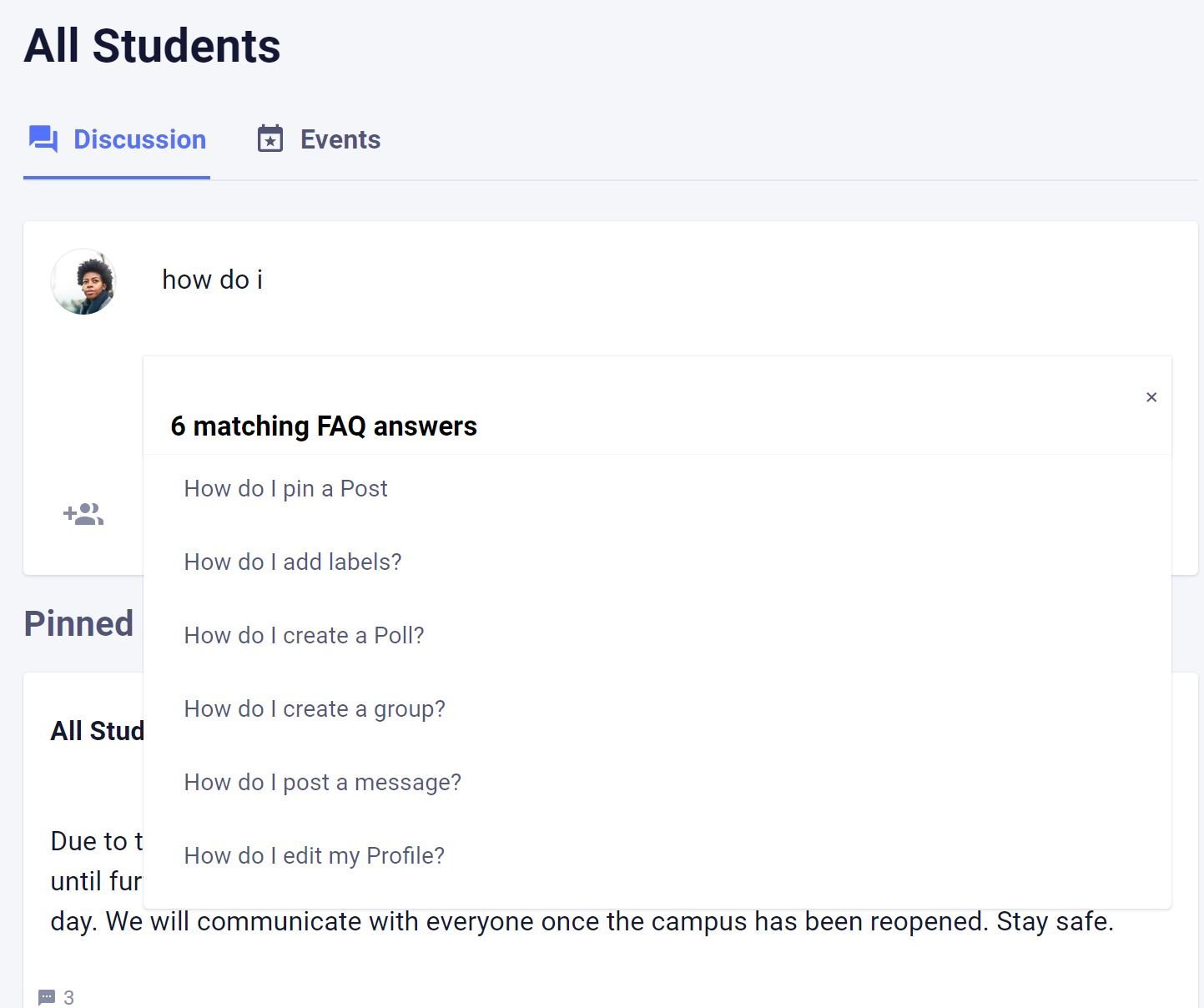Watch Jimmy Kimmel’s, “Mean Tweets” bit once and you may come away thinking that no good can come from anonymous posts or social media. In the bit, he has celebrities read things said of them on Twitter, and the tweets are horrifying. The tweets are foul, cruel, and would likely not be said by most of the writers if face to face with the celebrity they are tweeting about.
and the tweets are horrifying. The tweets are foul, cruel, and would likely not be said by most of the writers if face to face with the celebrity they are tweeting about.
Why would we write about this on the Campus.app blog? Because it’s a legitimate concern by administrators when talking about the use of any community, social tool. And as Campus is a functional portal, a content dissemination platform, a mobile app, and a social system, the question should not become an elephant in the room.
The Issue
We have two executives on our team who implemented Campus as the “front door” / central hub for all student activity. In one of the first meetings with executives on their campus, this issue was brought up. It was discussed by a retirement-aged administrator who was hyper-concerned about the “image” of the school. “What if someone posts something inappropriate?” was the question.
Unfortunately our (current) leaders did not get a chance to reply directly to the administrator as another conversation broke out. But the question was discussed, at length, back in the Innovation center, by the implementation team. (Mostly for the purposes of debate and inoculation moving forward.) Those team’s thoughts reflect much of how we at Campus think of the issue.
Our Thoughts First, it is important to note that the Campus system is not anonymous. Occasionally we are asked by partners to create anonymous postings, but we have not done so yet. This is part of the reason why. When people can hide behind anonymity, the past decade of social media has shown that some do not handle it very well. (As evidenced in the comedy bit by Kimmel.)
First, it is important to note that the Campus system is not anonymous. Occasionally we are asked by partners to create anonymous postings, but we have not done so yet. This is part of the reason why. When people can hide behind anonymity, the past decade of social media has shown that some do not handle it very well. (As evidenced in the comedy bit by Kimmel.)
Second, as the system is not anonymous, flagging and reporting within the system are clean and easy. Anyone can report any post, sending a notice to any administrator or office the school desires. At the same time, three flags and a post is automatically taken down (not deleted, so it can be dealt with by administrators later). At the University mentioned previously, in 24 months of usage (by 97% of the students each week), our leaders who implemented the system report only twice was a post reported.
Next, we believe it is important to remember that regardless of whether problems, frustrations, concerns, or even anger is stated to the networked public (the research term for a social system such as this), those comments are being stated somewhere. If they are spoken in the cafeteria from one student to the table, all it does is sour those students with no ability to correct or fix the issue later. If they are being stated to a younger brother or friend back home, all that is happening is brand destruction. No one can fix the problem. Heck, nobody even knows the problem exists from the school’s perspective. Why not know and see the issues allowing experts to comment, help, and even fix things?
An off-chute of that issue is having students post negative comments or problems to their own social channels. Now that comment really has gone public! It’s one thing for students to see other student issues, but it is another thing entirely when the world sees those same issues. By giving students a natural, healthy, and even solution-based system to generate those thoughts, it takes much of the steam out of angry or frustrated learners.
 At the same time, don’t underestimate the power of crowd sourcing. Students help and support other students extremely well. That help typically comes faster than staff can muster and 99% of the time, the help is accurate.
At the same time, don’t underestimate the power of crowd sourcing. Students help and support other students extremely well. That help typically comes faster than staff can muster and 99% of the time, the help is accurate.
What should you do regarding the 1% of the help is inaccurate? Use keywords and key phrases to help you find problem spots. That is why our keyword / keyphrase triggers are so powerful. Not only can you be alerted if someone swears (which were the 2 events in 24 months listed earlier) or says something distasteful. You can start, often for the first time ever, to see things like depression. Counseling staff can be alerted when specific terms or phrases are used. But even more pragmatically than that, any office can be alerted based on any kind of problem.
Student parking tickets a struggle? The ticketing office can receive an alert whenever someone writes “Parking ticket” in Campus. (As in, “how do I pay this parking ticket?”) Students struggle to register each term? The registrar can be notified whenever students write of struggles or errors. The point is that your people most likely already know the common issues. They know when and why students struggle. So let the system alert them to those issues in real time. Deal with those problems now so students don’t give up or dropout.
 Even those FAQs get a fresh look. Beyond the problems that require intervention, you have dozens (hundreds?) of FAQ’s to present to students, right? Instead of putting them all on a page and hoping students go to that page, let our system auto-fill questions and answer them appropriately. When schools push their FAQs to Campus, the system will watch for stems like, “How do I…” or “Where should I”, etc. A gray list of possible questions will emerge just like when searching Google. If it’s not a frequently asked question, no problem. But if it is, the student can choose it and see the answer immediately.
Even those FAQs get a fresh look. Beyond the problems that require intervention, you have dozens (hundreds?) of FAQ’s to present to students, right? Instead of putting them all on a page and hoping students go to that page, let our system auto-fill questions and answer them appropriately. When schools push their FAQs to Campus, the system will watch for stems like, “How do I…” or “Where should I”, etc. A gray list of possible questions will emerge just like when searching Google. If it’s not a frequently asked question, no problem. But if it is, the student can choose it and see the answer immediately.
Finally, the last thing we like to point out to administrators is that social media and written communication is an identified need for students turned employees. Bosses struggle with communication woes, asking why students didn’t learn about how to leverage social media in school. So help them out. Show students in a safe environment what it is to share content, create a profile, and network. That includes education around communication. Help students use social media wisely and help businesses find employees who make them look good, instead of embarrassed.
Summing Up
Will something be written at some point that makes an administrator cringe? Sure. Ours is the business of people and sometimes people make mistakes. But we find there is a difference in administrators. There are those who have a conservative, “let’s pretend everything is great” mindset, wanting to control as much of the student experience as possible. But the other side of that coin are administrators who want to help students in every way possible. They want to know what students think and they want every possible teachable moment to be exploited. These two administrators react very differently when posed with the question, “what if a student posts something you don’t like?”
The former says, “shut it all down! Turn it off! What if somebody sees that?!” Whereas the latter says, “great. Now we know. Let’s bring that student in and have a conversation that will likely help them forever.”
Good luck and good learning.